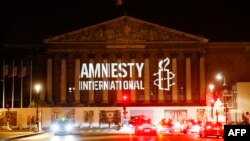Amnesty International on Wednesday joined calls for the Cambodian government and participating political parties in the general election on Sunday to commit to respecting human rights during the election period and its aftermath.
The ruling Cambodian People’s Party is expected to win the election comfortably having overseen the dissolution of the country’s main opposition, the Cambodia National Rescue Party, in November. The CNRP had won more than 40 percent of the popular vote in the previous general election in 2013 and in local elections in 2017. Some 19 other political parties are due to contest seats in the election on Sunday.
Clare Algar, Amnesty’s director of global operations, called on the government to amend or repeal a law governing conduct during protests, the Law on Peaceful Demonstration, to protect Cambodians’ freedom of assembly and to conform to international standards.
“The government also threatened legal action against those who ‘appeal, incite, or prevent citizens from voting’ following the banned opposition’s calls for an election boycott, which the ruling party claims is ‘incitement to obstruct an election,’” read the statement.
“Furthermore, despite freedom of peaceful assembly being guaranteed by the Constitution, activists and human rights defenders participating in peaceful demonstration still often face intervention, arrests, and violence from the police and other extra-legal authorities,” it says.
Amnesty is also calling for detailed legislation and a comprehensive code of conduct on the use of force by law enforcement personnel. Further, it urged the government to end the suppression of activism and to repeal or amend the Law on Associations and Non-governmental Organizations and Trade Union Law to conform to Cambodia’s international human rights and labor law commitments.
Sok Eysan, CPP spokesman, said the appeals made by Amnesty did not reflect the political reality in Cambodia.
“By contrast, the government always cares about the promotion of human rights and democracy in Cambodia, enhancing the rights and freedom of the people, so they can fulfill their obligations in voting,” he said.
Sam Inn, secretary general of the Grassroots Democracy Party, acknowledged the shrinking space for human rights and freedom of expression following the crackdown on civil society, independent media and the arbitrary detention of activists and campaigners.
“We welcome all the concerns and what they [Amnesty International] have mentioned. The Grassroots Democratic Party is resisting to promote human rights and freedom of expression; particularly, the rights to participate in politics,” he said.
Amnesty also called for the release of Cambodia’s political prisoners, including two former reporters with Radio Free Asia. However, Eysan, the CPP spokesman, said their release would encourage a “culture of impunity” in Cambodia, which under the CPP is regularly cited as one of the world’s most corrupt nations.
“The important thing is that those who committed offenses must be held accountable before the law,” he said.




